 |
Organic Society
The Role of Economy in the Collapse
of the Medieval Mentality
Plinio Corrêa de Oliveira
Comparing the medieval and the Renaissance mentalities, we see that the latter abandoned the ideals of sacrifice and fight as the predominant notes in life. The classic model of Humanism is no longer the warrior hero. The Renaissance man did not completely reject the great warrior as a model, but placed him alongside the great philosopher, the great artist, the great orator etc. These new human models were considered equal to the warrior, or even superior to him.
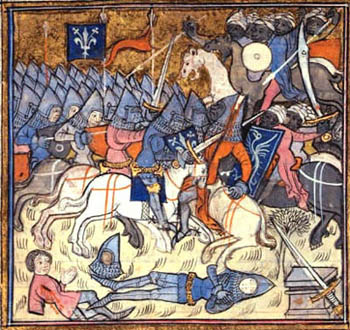
The Crusader, fighting and dying for the Catholic Faith, was the model of the medieval man |
For the medieval mentality, however, it was the knight who held the first place among the Catholic human models for a man. Once the knight was removed as the highest model ideal, some of the strong bones in the social structure became cartilage.
By removing the warrior from this top position, the Renaissance changed the medieval pattern of life. A new model was presented in which Catholic pugnacity was rejected and replaced by the desire to enjoy life. Catholic pugnacity demands enormous sacrifices, at times even the immolation of one’s life on the battlefield in defense of the Catholic Faith. Without such sacrifice, there is no heroism.
Humanism removed God from the center of life and put man in His place. The consequence of this was an end to the battle for the Catholic Faith, an end to offering one’s life in its defense. The notion that the Catholic should live his whole life in a continuous battle, sacrificing himself in a constant holocaust, is the only correct position. Insofar as we move away from the purifying flames of this holocaust, we become soft; the softer we become, the more we flee the holocaust. It is a vicious cycle.
This change of model ideals for man represented an important step of the Revolution. The revolutionary spirit of enjoying life that came from this transformation gradually permeated the Catholic West.
The birth of international commerce and banks
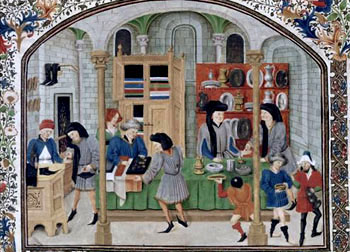
An artificial growth of commerce brought a dependence on money |
At the same time this change of mentality was taking place, international commerce, with the corresponding rise of banks, was taking shape. So, the modern economy, which would have had different features if the medieval mentality had endured, also assumed a revolutionary aspect. That is, the modern economy was born favoring the Revolution.
I am not saying that economics is the cause of the Revolution. What I am saying is that the economic system born in that time became an important factor to promote the Revolution. The main cause of the Revolution was doctrinal and ideological. A new economics was utilized to assist those doctrinal errors.
Is an inorganic economy more powerful than doctrine to generate the Revolution? No, the most powerful force is always the spiritual one. But when one analyzes what happened, one can note that economics was used to help spread revolutionary ideals.
The birth of the bourgeoisie as a tumor in society
Let me give you an example: the birth of the bourgeois mentality and the birth of the bourgeoisie as a social class. The bourgeoisie appeared in medieval society as a kind of tumor, an unhealthy growth alien to the body.
Was it strong enough to demolish medieval society? No, I don’t think so. I believe that had there been honest, upright men who forming the bourgeoisie, along with honest, upright men in the clergy and nobility, the problem could have been resolved. It would have been a benign tumor that would not have taken the life of medieval society. The Revolution, however, infiltrated the bourgeoisie, and the benign tumor became cancerous and began to kill the medieval social order.
The bourgeoisie become cancerous because it was constituted of men who had money, and, for the sole reason that they had accumulated a large amount of money, they wanted to occupy a ruling place in society. This is completely wrong, since society must be directed by its organic leaders.
An artificial demand for products favored the expansion of commerce
How did this happen? I have a thesis - although I have not had time to find the concrete evidence to prove it. The bourgeoisie was born from a hypertrophy of international commerce, which was flourishing because it was fed by an artificial demand for products. This artificial demand was based on moral vices such as envy.
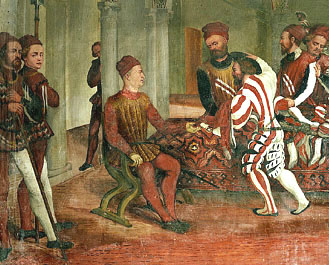
Italian merchants present a Danish noble with clothes and carpets |
An artificially produced demand for international goods induced persons to seek out things they did not need, and to abandon their regional and national goods. By doing this, they broke their organic, self-sufficient and independent economy, which is the economy that should prevail in a healthy society. I believe that behind the abandonment of this sound medieval economy, a moral vice was present.
It is natural that a small local commerce should develop in villages and cities, as in fact happened before the new phenomenon of international trade. That local commerce was sufficient to provide the goods the area needed and to maintain its small shops and businesses, which normally included the area guilds - the baker, the fisherman, the winemaker, the butcher, the small farmer, etc. Everything had a human proportion. The stores were run by the bourgeois, who were simple people just like the peasants and the artisans.
With the development of a grand commerce, however, grand opportunities appeared and, with them, the possibility to quickly accumulate a large amount of money; thus the large capital appeared. Such capital is money not linked to the real value of things. So, the emphasis of the new economy was transferred from what is the real wealth of an area - the land with its products - to the symbol of wealth, money. With the artificial expansion of commerce came the possibility of overnight fortunes being created and the accompanying economic delirium, which altered the genuine, solid and organic structure of society.
I have the suspicion that this would not have happened had there been more virtuous men. A good economy is one that is more closely linked to the earth. The modern economy had at its root a moral vice, that of envy. This is a thesis that I still have to prove.
Envy stimulates demand in international commerce
Let us consider, for example, the splendid fabrics produced in various cities of southern France and northern Italy. On the one hand, we can understand why persons from Sweden, Norway or Scotland would want to purchase those fabrics. Since they were very well made, men from other areas naturally wanted to acquire them. So, there is justification for an international commerce to exist and for a large reserve of money - capital - to maintain it.
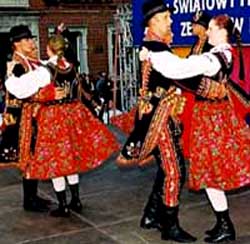
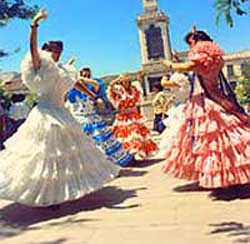
Polish and Spanish regional costumes: each with its proportional beauty |
On the other hand, if we consider the situation carefully, we see that the balanced man does not chase after splendid fabrics only because they become accessible to him. He avoids adopting a style or fashion that is not proportionate to his own less sophisticated culture and smaller means. Instead of rushing out to purchase those fabrics at any cost, he tries to improve the local textiles, using the resources of his area. Based on a model ideal of that fabric in southern France, he sees what is possible to create that would be proportionate to the way of living of his region. That is, the French fabric may inspire a healthy and moderate progress in Swedish textiles, but never a frenetic search for it. If he does not maintain this balanced position, he can easily assume an attitude bordering on envy of his neighbor’s goods.
In fact, why should a lady from Sweden become anxious to wear an exquisite silk from southern France? Wouldn’t her human type be much better suited to a fabric more appropriate to her with its own local characteristics, qualities and beauties? Why should everyone be French or imitate France?
We see that there is something of coveting our neighbors’ good in this desire to look like others, to imitate others. It is rooted in envy for the goods of one’s neighbor.
It is common for Brazilians to admire French culture; almost all of us have this admiration. But this does not lead us to imitate France at any cost and try to look like French people. Anyone who would begin to assume French airs would appear ridiculous. We admire France, but we are not French people; we are Brazilians. God made us such, and such we should remain.
Today, there are splendid English cashmeres for men’s suits. Is it correct for us to wear these select English cashmeres exclusively and then go to our Jockey Clubs to watch the races imitating the English? I believe there is a moral deformation in the indiscriminate imitation of the customs of other peoples. We should have our own customs, feasts and diversions, and be happy with what God gave us. In my opinion, it is this moral deformation, where everyone is obsessed with imitating others, that leads to the development of a gigantic and inorganic international commerce.

Posted July 2, 2008

  | | Prof. Plinio |
Organic Society was a theme dear to the late Prof. Plinio Corrêa de Oliveira. He addressed this topic on countless occasions during his life - at times in lectures for the formation of his disciples, at times in meetings with friends who gathered to study the social aspects and history of Christendom, at times just in passing.
Atila S. Guimarães selected excerpts of these lectures and conversations from the trancripts of tapes and his own personal notes. He translated and adapted them into articles for the TIA website. In these texts fidelity to the original ideas and words is kept as much as possible.

Related Topics of Interest
 Respectability in the Medieval Professions Respectability in the Medieval Professions
 The Decay of the Medieval Guilds The Decay of the Medieval Guilds
 Proportion Between the City and the Man Proportion Between the City and the Man
 The Investiture of the Knight The Investiture of the Knight
 Clans and Human Types Clans and Human Types
 Vocations of the European Peoples Vocations of the European Peoples
 Revolution and Counter-Revolution in the Tendencies, Ideas, and Facts Revolution and Counter-Revolution in the Tendencies, Ideas, and Facts

|
Organic Society | Social-Political | Home | Books | CDs | Search | Contact Us

© 2002-
Tradition in Action, Inc. All Rights Reserved
|
 |
|